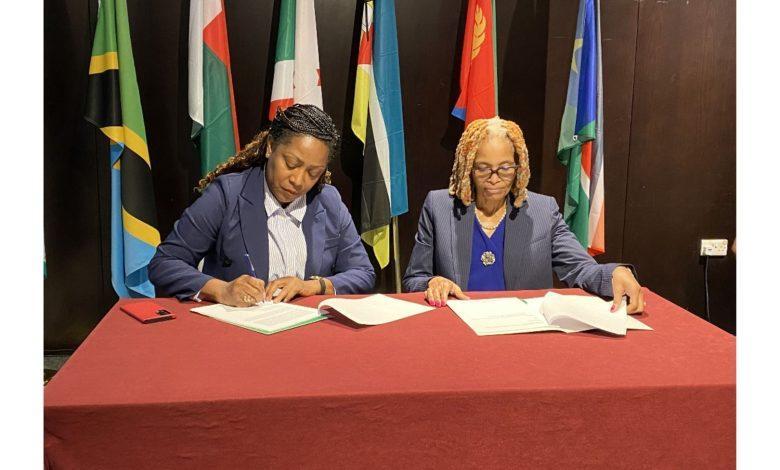Africa-Press – Tanzania. THE African Development Bank (AfDB) and the Eastern and Southern Africa Anti-Money Laundering Group (ESAAMLG) have signed a 5.2 million US dollars (about 13.3bn/-) three-year regional project to strengthen capacity in combating money laundering and terrorist financing.
The initiative, known as the Regional Capacity Development Project on Anti-Money Laundering and Countering the Financing of Terrorism (ESCAD-AML), will benefit five ESAAMLG member states including Burundi, Eritrea, Mozambique, South Sudan and Madagascar.
Funded by the AfDB, the project seeks to enhance the capacity of selected transition countries in Eastern and Southern Africa to combat money laundering (ML), terrorism financing (TF) and illicit financial flows (IFFs).
It also aims to address structural fragility while creating opportunities to build long term resilience.
The core components of the project encompass supporting national ML/TF risk assessments, developing national AML/CFT strategies and conducting Mutual Evaluations, strengthening institutional capacity for AML/CFT frameworks and ensuring effective project coordination and management.
The event was held yesterday in Dar es salaam and attended by representatives of the beneficiary member states, development partners as well as Bank of Tanzania (BOT) Deputy Governor Ms Sauda Msemo.
AfDB Director of Economic, Governance and Reforms, Mr Abdoulaye Coulibaly stressed the critical importance of the initiative in safeguarding the integrity of Africa’s financial ecosystem.
He said the project is a milestone in regional cooperation and reflects the Bank’s commitment to support member countries in enhancing their anti-financial crime frameworks.
He highlighted alarming statistics that underscore the urgency of the effort, noting that Africa currently loses an estimated 587billion US dollars annually through illicit financial flows exceeding the 578 billion US dollars raised in 2023.
Moreover, he said approximately 270.5 million US dollars is lost annually due to tax evasion facilitated by international cooperation loopholes and around 189 billion US dollars worth of natural capital, including resources from illegal mining, fishing and trade, are lost each year.
“These figures represent about 25 per cent of Africa’s GDP, severely undermining social-economic progress,” he said.
He said the consequences of illicit financial activities are profound as they weaken state capacity, reduce domestic resource mobilisation, disrupt development in critical sectors such as healthcare, education and infrastructure and erode governance, transparency and accountability at multiple levels.
He said currently, many African countries lack the institutional capacity to fully comply with international standards on anti-money laundering (AML) and combating the financing of terrorism (CFT).
“To address these challenges, the AfDB is prioritising support to member countries through comprehensive policy frameworks and strategic action plans,” he said.
ESAAMLG Executive Secretary, Ms Fikile Zitta described the project as a landmark initiative in strengthening anti-money laundering (AML) and combating the financing of terrorism (CFT) frameworks across the selected regions.
She said over the next three years, the initiative will deliver crucial technical assistance,capacity building and institutional strengthening to enhance the effectiveness of national systems.
This preparation will enable the countries to successfully undergo upcoming mutual evaluations and ensure full compliance with international AML/CFT standards.
“This new chapter marks a journey toward stronger, more resilient and multifaceted financial systems across our member countries. We must seize this opportunity to build robust national capacities, foster interagency cooperation and support political will within our states,” she said.
Moreover, Ms Msemo, said the project is a timely and critical intervention to assist countries at crucial junctions in strengthening their anti-money laundering and counter-terrorism financing systems.
“Several beneficiary countries, such as South Sudan and Mozambique, are currently listed on the FATF (Financial Action Task Force) blacklist and face international scrutiny. This initiative will support these nations and others, including Burundi, Eritrea, and Madagascar, in aligning with international standards,” she said.
Ms Msemo highlighted Tanzania’s own journey in reforming its financial crime frameworks after being identified for weaknesses in its antimoney laundering and counterfinancing of terrorism (AML/ CFT) regime in October 2022.
She said the country undertook significant reforms including strengthening legal frameworks, restructuring supervisory bodies and enhancing intelligence collaboration, culminating in Tanzania’s removal from the FATF grey list in June this year.
For More News And Analysis About Tanzania Follow Africa-Press







